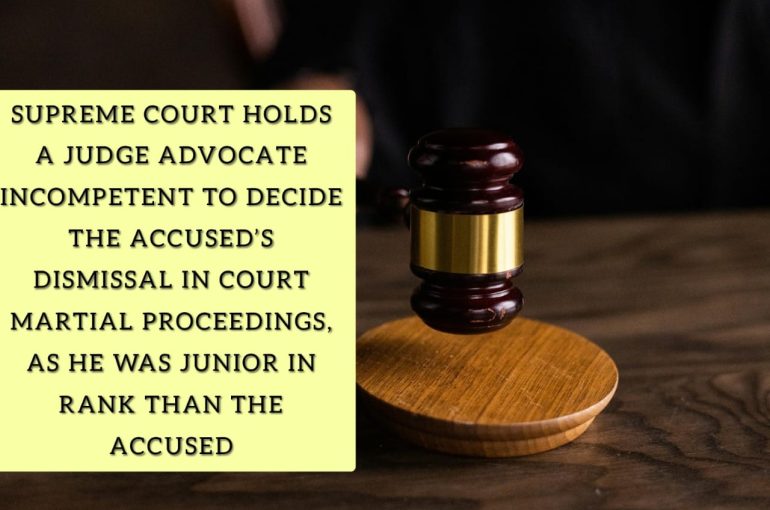SUPREME COURT HOLDS A JUDGE ADVOCATE INCOMPETENT TO DECIDE THE ACCUSED’S DISMISSAL IN COURT MARTIAL PROCEEDINGS, AS HE WAS JUNIOR IN RANK THAN THE ACCUSED
Are you familiar with the legal intricacies of appointing a Judge Advocate in a Court Martial? How important is it for the officer holding this position to be equal or superior rank to the accused?
The Supreme Court in a recent case of Union Of India & ORS. Vs. LT. COL. Rahul Arora CA No. 2459 of 2017, passed a Judgement dated September 09, 2024,
Facts
The Respondent- Rahul Arora, designated as a Graded ENT Specialist and later upgraded as classified Specialist ENT in the year 2001 in the Armed Forces, faced a dismissal after a General Court Martial (GCM) found him guilty of three charges: for altering a recruit’s medical fitness status for a bribe that is an offence under Section 57(c) of the Army Act 1950; for being absent without leave, which is also an offence under Section 39(a) of the Army Act (I); and for exhibiting conduct that is unbecoming of an officer under Section 45 of the Army Act 1950. The GCM’s decision was challenged before the Ld. Armed Forces Tribunal (AFT), which upheld the findings and the sentence. The Respondent contested this decision through the Armed Forces Tribunal, which upheld both the findings and the dismissal.
Subsequently, the Respondent appealed to the High Court of Punjab and Haryana, which vide Order dated 21.05.2014, overturned the Tribunal’s decision on the grounds of procedural irregularity related to the appointment of the Judge Advocate.
Issue
Whether a Judge Advocate must be of equal or superior rank to the accused officer and what are the implications of failing to adhere to this requirement.
The High Court’s Analysis
The High Court allowed the Writ Petition preferred by the Respondent solely on the ground that an officer junior to the Respondent had acted as Judge Advocate in the GCM contrary to the law laid down by this Court in Union of India & Anr. vs. Charanjit Singh Gill (2000 (5) SCC 742), held that the appointment of a Judge Advocate of a lower rank than the accused is impermissible unless explicitly documented in the convening order i.e. owing to the non-availability of a suitably ranked officer. The High Court’s ruling emphasised that such a procedural lapse impacts the fairness of the trial.
Supreme Court’s Judgement
The Supreme Court of India, in its ruling on this matter, reinforced the necessity of appointing a Judge Advocate of equal or superior rank to the accused. The Court’s judgement highlighted the critical role of the Judge Advocate in ensuring the procedural fairness of Court Martial proceedings. As the Judge Advocate provides essential legal advice and oversees the adherence to proper judicial procedures, appointing an officer of lower rank could potentially compromise the integrity of the trial and affect the accused’s right to a fair trial.
The Supreme Court’s decision emphasises the principle that the appointment of a Judge Advocate is not a mere procedural formality but a fundamental aspect of ensuring justice within military adjudication. The requirement for the Judge Advocate to hold an equal or higher rank than the accused is designed to uphold the fairness and impartiality of the proceedings, reflecting the broader principles of due process.
In the legal system, a Judge Advocate plays a pivotal role in ensuring that the proceedings of a Court Martial are conducted fairly and impartially. As stated in the case, appointing a Judge Advocate of lower rank than the accused officer can lead to conflicts of interest, lack of credibility, and a compromised sense of justice. This is why it is crucial for a Judge Advocate to be of equal or superior rank to maintain the integrity of the process.
The ruling in the present case serves as a significant reminder of the procedure required to be followed in Court Martial proceedings. The Court reiterated the importance of appointing a ‘fit person’ as the Judge Advocate to ensure the integrity of the trial process. This case reinforces the broader legal principle that procedural fairness is integral to the judicial process and that deviations from established norms can lead to the invalidation of judicial outcomes.
Conclusion
The Supreme Court’s judgement in this case not only addressed the specific issue of the Judge Advocate’s rank but also affirmed the commitment to fairness and integrity in military justice. The decision reinforces the necessity for strict adherence to procedural requirements and serves as a precedent for future cases involving similar issues in Court Martial proceedings, by observing that the Judge Advocate ought to be of a rank equal to or higher than the accused.
Hence, for the aforesaid reasons, the Apex Court dismissed the Appeal filed by the Union of India, as the appointment of Judge Advocate, who was of a rank junior to that of the Respondent-Accused, was invalid and unsustainable in law.
Shikha Pandey
Associate
The Indian Lawyer & Allied Services





































Leave a Reply